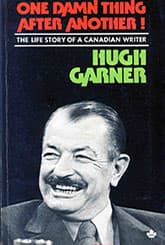Hugh Garner
Critique • Views and quotes

Born
Batley, England, 1913
Died
Toronto, 1979
Publications
Novels, stories, memoirs, radio scripts, screenplays, essays
Genres
Literary, crime, mystery, journalism
Writing language
English
Place of writing
Canada
Novels
• Cabbagetown (1950)
Stories
• "The Yellow Sweater" (1951)
sCanadian Literature
• Cabbagetown (1950)
• Hugh Garner's Best Stories (1963)
On books, writers and writing
1964
I have had a wonderful time as a freelance writer, and at one stage of my career was on my way to becoming rich, but I nipped that in the bud. There is no other job for which I was so fitted psychologically and temperamentally, and no other career which would have interfered less with my drinking.
— Introduction, Author! Author!
1968
[Re: on the rehabilitation of Toronto's Cabbagetown neighbourhood:]
But perhaps [Cabbagetown character] Ken Trilling would have said, "Talking like that borders on the sentimental, and nobody should get eulogistic over a slum."
— Preface to new Cabbagetown edition
1973
There is no such thing as a "born writer." There are, however, people who, from an ingrained love of literature, a childhood conditioning to reading as entertainment or relaxation, and a driving, inexplainable urge to express themselves through the written word, sometimes become writers. The three conditions outlined above may not be true of all writers, but they were true of me....
The formal education a fiction writer needs,and many of the better ones haven't even had this, is a grade school ability to spell the words of the language, the skill to place them in a sentence one after the other, the sentences into paragraphs, and in the case of a novel, the paragraphs into chapters and the chapters into a book.
— Preface, One Damn Thing After Another!
All these six winners of the Nobel Prize of Literature learned most of their trade in the streets. John Steinbeck received the education necessary to write The Grapes of Wrath from ten weeks on a WPA project picking beans in California's San Joaquin Valley. Pearl Buck picked up her most notable material from the streets of Chinese cities. William Faulkner hung around the town square of Oxford, Mississippi and wrote some of his books on the back of a coal shovel while tending boilers in his home town. Eugene O'Neill wrote The Hairy Ape from his experiences as a fireman on U.S. merchant ships. Sinclair Lewis wrote a series of books from his observations of his fellow citizens of Sauk Center, Minnesota. Ernest Hemingway, whose training came mainly from early interpretive journalism, learned his trade on the Kansas City Star, the Toronto Star Weekly, and in bordellos, bistros and bars from Key West to the Paris Latin Quarter.
Of the six, O'Neill, Lewis, Faulkner and Hemingway were alcoholics. Steinbeck was a non-alcoholic heavy drinker, and only Pearly Buck seems to have controlled her drinking, if she drank at all. The point to all this is that a slight smattering of education can help a writer, but being an alcoholic is almost a necessity if you want to win the Nobel Prize for Literature.
Critique • Views and Quotes

